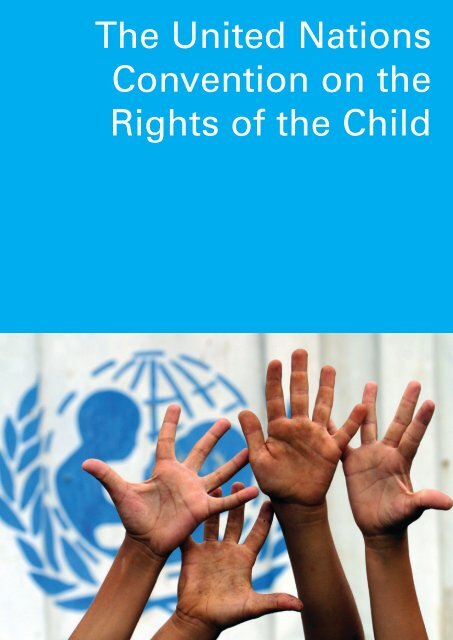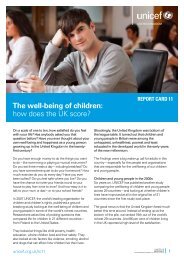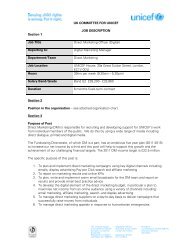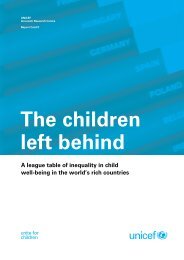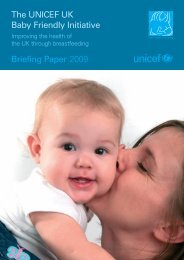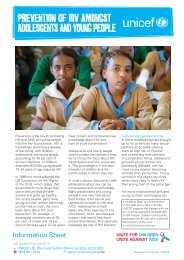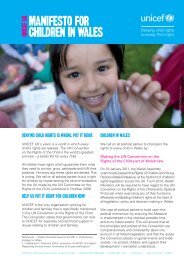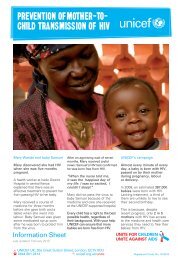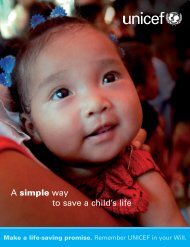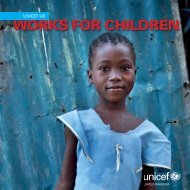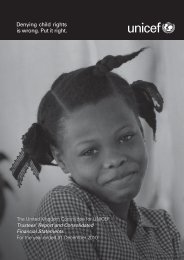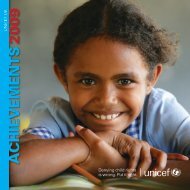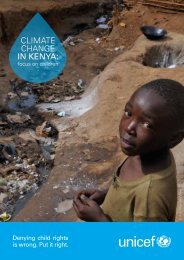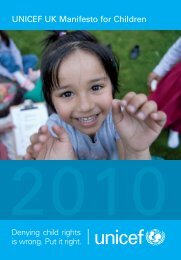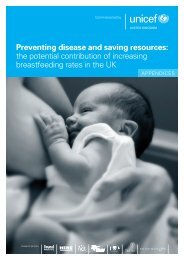The United Nations Convention on the Rights of the Child - Unicef UK
The United Nations Convention on the Rights of the Child - Unicef UK
The United Nations Convention on the Rights of the Child - Unicef UK
Create successful ePaper yourself
Turn your PDF publications into a flip-book with our unique Google optimized e-Paper software.
<str<strong>on</strong>g>The</str<strong>on</strong>g> <str<strong>on</strong>g>United</str<strong>on</strong>g> <str<strong>on</strong>g>Nati<strong>on</strong>s</str<strong>on</strong>g><br />
<str<strong>on</strong>g>C<strong>on</strong>venti<strong>on</strong></str<strong>on</strong>g> <strong>on</strong> <strong>the</strong><br />
<strong>Rights</strong> <strong>of</strong> <strong>the</strong> <strong>Child</strong>
<str<strong>on</strong>g>C<strong>on</strong>venti<strong>on</strong></str<strong>on</strong>g> <strong>on</strong> <strong>the</strong> <strong>Rights</strong> <strong>of</strong> <strong>the</strong> <strong>Child</strong><br />
Adopted and opened for signature, ratificati<strong>on</strong> and accessi<strong>on</strong> by General Assembly<br />
Resoluti<strong>on</strong> 44/25 <strong>of</strong> 20 November 1989<br />
entry into force 2 September 1990, in accordance with Article 49<br />
<str<strong>on</strong>g>The</str<strong>on</strong>g> States Parties to <strong>the</strong> present <str<strong>on</strong>g>C<strong>on</strong>venti<strong>on</strong></str<strong>on</strong>g>,<br />
Preamble<br />
C<strong>on</strong>sidering that, in accordance with <strong>the</strong> principles proclaimed in <strong>the</strong> Charter <strong>of</strong> <strong>the</strong> <str<strong>on</strong>g>United</str<strong>on</strong>g> <str<strong>on</strong>g>Nati<strong>on</strong>s</str<strong>on</strong>g>,<br />
recogniti<strong>on</strong> <strong>of</strong> <strong>the</strong> inherent dignity and <strong>of</strong> <strong>the</strong> equal and inalienable rights <strong>of</strong> all members <strong>of</strong> <strong>the</strong> human<br />
family is <strong>the</strong> foundati<strong>on</strong> <strong>of</strong> freedom, justice and peace in <strong>the</strong> world,<br />
Bearing in mind that <strong>the</strong> peoples <strong>of</strong> <strong>the</strong> <str<strong>on</strong>g>United</str<strong>on</strong>g> <str<strong>on</strong>g>Nati<strong>on</strong>s</str<strong>on</strong>g> have, in <strong>the</strong> Charter, reaffirmed <strong>the</strong>ir faith in<br />
fundamental human rights and in <strong>the</strong> dignity and worth <strong>of</strong> <strong>the</strong> human pers<strong>on</strong>, and have determined to<br />
promote social progress and better standards <strong>of</strong> life in larger freedom,<br />
Recognizing that <strong>the</strong> <str<strong>on</strong>g>United</str<strong>on</strong>g> <str<strong>on</strong>g>Nati<strong>on</strong>s</str<strong>on</strong>g> has, in <strong>the</strong> Universal Declarati<strong>on</strong> <strong>of</strong> Human <strong>Rights</strong> and in <strong>the</strong><br />
Internati<strong>on</strong>al Covenants <strong>on</strong> Human <strong>Rights</strong>, proclaimed and agreed that every<strong>on</strong>e is entitled to all <strong>the</strong> rights<br />
and freedoms set forth <strong>the</strong>rein, without distincti<strong>on</strong> <strong>of</strong> any kind, such as race, colour, sex, language, religi<strong>on</strong>,<br />
political or o<strong>the</strong>r opini<strong>on</strong>, nati<strong>on</strong>al or social origin, property, birth or o<strong>the</strong>r status,<br />
Recalling that, in <strong>the</strong> Universal Declarati<strong>on</strong> <strong>of</strong> Human <strong>Rights</strong>, <strong>the</strong> <str<strong>on</strong>g>United</str<strong>on</strong>g> <str<strong>on</strong>g>Nati<strong>on</strong>s</str<strong>on</strong>g> has proclaimed that<br />
childhood is entitled to special care and assistance,<br />
C<strong>on</strong>vinced that <strong>the</strong> family, as <strong>the</strong> fundamental group <strong>of</strong> society and <strong>the</strong> natural envir<strong>on</strong>ment for <strong>the</strong> growth<br />
and well-being <strong>of</strong> all its members and particularly children, should be afforded <strong>the</strong> necessary<br />
protecti<strong>on</strong> and assistance so that it can fully assume its resp<strong>on</strong>sibilities within <strong>the</strong> community,<br />
Recognizing that <strong>the</strong> child, for <strong>the</strong> full and harm<strong>on</strong>ious development <strong>of</strong> his or her pers<strong>on</strong>ality, should grow<br />
up in a family envir<strong>on</strong>ment, in an atmosphere <strong>of</strong> happiness, love and understanding,<br />
C<strong>on</strong>sidering that <strong>the</strong> child should be fully prepared to live an individual life in society, and brought up in <strong>the</strong><br />
spirit <strong>of</strong> <strong>the</strong> ideals proclaimed in <strong>the</strong> Charter <strong>of</strong> <strong>the</strong> <str<strong>on</strong>g>United</str<strong>on</strong>g> <str<strong>on</strong>g>Nati<strong>on</strong>s</str<strong>on</strong>g>, and in particular in <strong>the</strong> spirit <strong>of</strong> peace,<br />
dignity, tolerance, freedom, equality and solidarity,<br />
Bearing in mind that <strong>the</strong> need to extend particular care to <strong>the</strong> child has been stated in <strong>the</strong> Geneva<br />
Declarati<strong>on</strong> <strong>of</strong> <strong>the</strong> <strong>Rights</strong> <strong>of</strong> <strong>the</strong> <strong>Child</strong> <strong>of</strong> 1924 and in <strong>the</strong> Declarati<strong>on</strong> <strong>of</strong> <strong>the</strong> <strong>Rights</strong> <strong>of</strong> <strong>the</strong> <strong>Child</strong> adopted by<br />
<strong>the</strong> General Assembly <strong>on</strong> 20 November 1959 and recognized in <strong>the</strong> Universal Declarati<strong>on</strong> <strong>of</strong> Human <strong>Rights</strong>,<br />
in <strong>the</strong> Internati<strong>on</strong>al Covenant <strong>on</strong> Civil and Political <strong>Rights</strong> (in particular in Articles 23 and 24), in <strong>the</strong><br />
Internati<strong>on</strong>al Covenant <strong>on</strong> Ec<strong>on</strong>omic, Social and Cultural <strong>Rights</strong> (in particular in Article 10) and in <strong>the</strong> statutes<br />
and relevant instruments <strong>of</strong> specialized agencies and internati<strong>on</strong>al organizati<strong>on</strong>s c<strong>on</strong>cerned with <strong>the</strong> welfare<br />
<strong>of</strong> children,<br />
Bearing in mind that, as indicated in <strong>the</strong> Declarati<strong>on</strong> <strong>of</strong> <strong>the</strong> <strong>Rights</strong> <strong>of</strong> <strong>the</strong> <strong>Child</strong>, “<strong>the</strong> child, by reas<strong>on</strong> <strong>of</strong> his<br />
physical and mental immaturity, needs special safeguards and care, including appropriate legal protecti<strong>on</strong>,<br />
before as well as after birth”,<br />
Recalling <strong>the</strong> provisi<strong>on</strong>s <strong>of</strong> <strong>the</strong> Declarati<strong>on</strong> <strong>on</strong> Social and Legal Principles relating to <strong>the</strong> Protecti<strong>on</strong> and<br />
Welfare <strong>of</strong> <strong>Child</strong>ren, with Special Reference to Foster Placement and Adopti<strong>on</strong> Nati<strong>on</strong>ally and<br />
Internati<strong>on</strong>ally; <strong>the</strong> <str<strong>on</strong>g>United</str<strong>on</strong>g> <str<strong>on</strong>g>Nati<strong>on</strong>s</str<strong>on</strong>g> Standard Minimum Rules for <strong>the</strong> Administrati<strong>on</strong> <strong>of</strong> Juvenile Justice (<str<strong>on</strong>g>The</str<strong>on</strong>g><br />
Beijing Rules) ; and <strong>the</strong> Declarati<strong>on</strong> <strong>on</strong> <strong>the</strong> Protecti<strong>on</strong> <strong>of</strong> Women and <strong>Child</strong>ren in Emergency and Armed<br />
C<strong>on</strong>flict, Recognizing that, in all countries in <strong>the</strong> world, <strong>the</strong>re are children living in excepti<strong>on</strong>ally<br />
difficult c<strong>on</strong>diti<strong>on</strong>s, and that such children need special c<strong>on</strong>siderati<strong>on</strong>,<br />
Taking due account <strong>of</strong> <strong>the</strong> importance <strong>of</strong> <strong>the</strong> traditi<strong>on</strong>s and cultural values <strong>of</strong> each people for <strong>the</strong> protecti<strong>on</strong><br />
and harm<strong>on</strong>ious development <strong>of</strong> <strong>the</strong> child, Recognizing <strong>the</strong> importance <strong>of</strong> internati<strong>on</strong>al cooperati<strong>on</strong> for<br />
improving <strong>the</strong> living c<strong>on</strong>diti<strong>on</strong>s <strong>of</strong> children in every country, in particular in <strong>the</strong> developing countries,<br />
Have agreed as follows:<br />
3
PART I<br />
Article 1<br />
For <strong>the</strong> purposes <strong>of</strong> <strong>the</strong> present <str<strong>on</strong>g>C<strong>on</strong>venti<strong>on</strong></str<strong>on</strong>g>, a child means every human being below <strong>the</strong> age <strong>of</strong> 18 years<br />
unless under <strong>the</strong> law applicable to <strong>the</strong> child, majority is attained earlier.<br />
Article 2<br />
1. States Parties shall respect and ensure <strong>the</strong> rights set forth in <strong>the</strong> present <str<strong>on</strong>g>C<strong>on</strong>venti<strong>on</strong></str<strong>on</strong>g> to each child within<br />
<strong>the</strong>ir jurisdicti<strong>on</strong> without discriminati<strong>on</strong> <strong>of</strong> any kind, irrespective <strong>of</strong> <strong>the</strong> child’s or his or her parent’s or legal<br />
guardian’s race, colour, sex, language, religi<strong>on</strong>, political or o<strong>the</strong>r opini<strong>on</strong>, nati<strong>on</strong>al, ethnic or social origin,<br />
property, disability, birth or o<strong>the</strong>r status.<br />
2. States Parties shall take all appropriate measures to ensure that <strong>the</strong> child is protected against all forms <strong>of</strong><br />
discriminati<strong>on</strong> or punishment <strong>on</strong> <strong>the</strong> basis <strong>of</strong> <strong>the</strong> status, activities, expressed opini<strong>on</strong>s, or beliefs <strong>of</strong> <strong>the</strong><br />
child’s parents, legal guardians, or family members.<br />
Article 3<br />
1. In all acti<strong>on</strong>s c<strong>on</strong>cerning children, whe<strong>the</strong>r undertaken by public or private social welfare instituti<strong>on</strong>s,<br />
courts <strong>of</strong> law, administrative authorities or legislative bodies, <strong>the</strong> best interests <strong>of</strong> <strong>the</strong> child shall be a<br />
primary c<strong>on</strong>siderati<strong>on</strong>.<br />
2. States Parties undertake to ensure <strong>the</strong> child such protecti<strong>on</strong> and care as is necessary for his or her<br />
well-being, taking into account <strong>the</strong> rights and duties <strong>of</strong> his or her parents, legal guardians, or o<strong>the</strong>r<br />
individuals legally resp<strong>on</strong>sible for him or her, and, to this end, shall take all appropriate legislative and<br />
administrative measures.<br />
3. States Parties shall ensure that <strong>the</strong> instituti<strong>on</strong>s, services and facilities resp<strong>on</strong>sible for <strong>the</strong> care or protecti<strong>on</strong><br />
<strong>of</strong> children shall c<strong>on</strong>form with <strong>the</strong> standards established by competent authorities, particularly in <strong>the</strong> areas<br />
<strong>of</strong> safety, health, in <strong>the</strong> number and suitability <strong>of</strong> <strong>the</strong>ir staff, as well as competent supervisi<strong>on</strong>.<br />
Article 4<br />
States Parties shall undertake all appropriate legislative, administrative, and o<strong>the</strong>r measures for <strong>the</strong><br />
implementati<strong>on</strong> <strong>of</strong> <strong>the</strong> rights recognized in <strong>the</strong> present <str<strong>on</strong>g>C<strong>on</strong>venti<strong>on</strong></str<strong>on</strong>g>. With regard to ec<strong>on</strong>omic, social and<br />
cultural rights, States Parties shall undertake such measures to <strong>the</strong> maximum extent <strong>of</strong> <strong>the</strong>ir available<br />
resources and, where needed, within <strong>the</strong> framework <strong>of</strong> internati<strong>on</strong>al co-operati<strong>on</strong>.<br />
Article 5<br />
States Parties shall respect <strong>the</strong> resp<strong>on</strong>sibilities, rights and duties <strong>of</strong> parents or, where applicable, <strong>the</strong><br />
members <strong>of</strong> <strong>the</strong> extended family or community as provided for by local custom, legal guardians or o<strong>the</strong>r<br />
pers<strong>on</strong>s legally resp<strong>on</strong>sible for <strong>the</strong> child, to provide, in a manner c<strong>on</strong>sistent with <strong>the</strong> evolving capacities <strong>of</strong><br />
<strong>the</strong> child, appropriate directi<strong>on</strong> and guidance in <strong>the</strong> exercise by <strong>the</strong> child <strong>of</strong> <strong>the</strong> rights recognized in <strong>the</strong> present<br />
<str<strong>on</strong>g>C<strong>on</strong>venti<strong>on</strong></str<strong>on</strong>g>.<br />
Article 6<br />
1. States Parties recognize that every child has <strong>the</strong> inherent right to life.<br />
2. States Parties shall ensure to <strong>the</strong> maximum extent possible <strong>the</strong> survival and development <strong>of</strong> <strong>the</strong> child.<br />
Article 7<br />
1. <str<strong>on</strong>g>The</str<strong>on</strong>g> child shall be registered immediately after birth and shall have <strong>the</strong> right from birth to a name, <strong>the</strong> right<br />
to acquire a nati<strong>on</strong>ality and. as far as possible, <strong>the</strong> right to know and be cared for by his or her parents.<br />
2. States Parties shall ensure <strong>the</strong> implementati<strong>on</strong> <strong>of</strong> <strong>the</strong>se rights in accordance with <strong>the</strong>ir nati<strong>on</strong>al law and<br />
<strong>the</strong>ir obligati<strong>on</strong>s under <strong>the</strong> relevant internati<strong>on</strong>al instruments in this field, in particular where <strong>the</strong> child would<br />
o<strong>the</strong>rwise be stateless.<br />
Article 8<br />
1. States Parties undertake to respect <strong>the</strong> right <strong>of</strong> <strong>the</strong> child to preserve his or her identity, including nati<strong>on</strong>ality,<br />
name and family relati<strong>on</strong>s as recognized by law without unlawful interference.<br />
2. Where a child is illegally deprived <strong>of</strong> some or all <strong>of</strong> <strong>the</strong> elements <strong>of</strong> his or her identity, States Parties shall<br />
provide appropriate assistance and protecti<strong>on</strong>, with a view to re-establishing speedily his or her identity.<br />
4
Article 9<br />
1. States Parties shall ensure that a child shall not be separated from his or her parents against <strong>the</strong>ir will,<br />
except when competent authorities subject to judicial review determine, in accordance with applicable law<br />
and procedures, that such separati<strong>on</strong> is necessary for <strong>the</strong> best interests <strong>of</strong> <strong>the</strong> child. Such determinati<strong>on</strong><br />
may be necessary in a particular case such as <strong>on</strong>e involving abuse or neglect <strong>of</strong> <strong>the</strong> child by <strong>the</strong> parents,<br />
or <strong>on</strong>e where <strong>the</strong> parents are living separately and a decisi<strong>on</strong> must be made as to <strong>the</strong> child’s place<br />
<strong>of</strong> residence.<br />
2. In any proceedings pursuant to paragraph 1 <strong>of</strong> <strong>the</strong> present article, all interested parties shall be given<br />
an opportunity to participate in <strong>the</strong> proceedings and make <strong>the</strong>ir views known.<br />
3. States Parties shall respect <strong>the</strong> right <strong>of</strong> <strong>the</strong> child who is separated from <strong>on</strong>e or both parents to maintain<br />
pers<strong>on</strong>al relati<strong>on</strong>s and direct c<strong>on</strong>tact with both parents <strong>on</strong> a regular basis, except if it is c<strong>on</strong>trary to <strong>the</strong><br />
child’s best interests.<br />
4. Where such separati<strong>on</strong> results from any acti<strong>on</strong> initiated by a State Party, such as <strong>the</strong> detenti<strong>on</strong>,<br />
impris<strong>on</strong>ment, exile, deportati<strong>on</strong> or death (including death arising from any cause while <strong>the</strong> pers<strong>on</strong> is in <strong>the</strong><br />
custody <strong>of</strong> <strong>the</strong> State) <strong>of</strong> <strong>on</strong>e or both parents or <strong>of</strong> <strong>the</strong> child, that State Party shall, up<strong>on</strong> request, provide <strong>the</strong><br />
parents, <strong>the</strong> child or, if appropriate, ano<strong>the</strong>r member <strong>of</strong> <strong>the</strong> family with <strong>the</strong> essential informati<strong>on</strong> c<strong>on</strong>cerning <strong>the</strong><br />
whereabouts <strong>of</strong> <strong>the</strong> absent member(s) <strong>of</strong> <strong>the</strong> family unless <strong>the</strong> provisi<strong>on</strong> <strong>of</strong> <strong>the</strong> informati<strong>on</strong> would be<br />
detrimental to <strong>the</strong> well-being <strong>of</strong> <strong>the</strong> child. States Parties shall fur<strong>the</strong>r ensure that <strong>the</strong> submissi<strong>on</strong> <strong>of</strong> such<br />
a request shall <strong>of</strong> itself entail no adverse c<strong>on</strong>sequences for <strong>the</strong> pers<strong>on</strong>(s) c<strong>on</strong>cerned.<br />
Article 10<br />
1. In accordance with <strong>the</strong> obligati<strong>on</strong> <strong>of</strong> States Parties under Article 9, paragraph 1, applicati<strong>on</strong>s by a child or<br />
his or her parents to enter or leave a State Party for <strong>the</strong> purpose <strong>of</strong> family reunificati<strong>on</strong> shall be dealt with<br />
by States Parties in a positive, humane and expeditious manner. States Parties shall fur<strong>the</strong>r ensure that <strong>the</strong><br />
submissi<strong>on</strong> <strong>of</strong> such a request shall entail no adverse c<strong>on</strong>sequences for <strong>the</strong> applicants and for <strong>the</strong> members<br />
<strong>of</strong> <strong>the</strong>ir family.<br />
2. A child whose parents reside in different States shall have <strong>the</strong> right to maintain <strong>on</strong> a regular basis, save in<br />
excepti<strong>on</strong>al circumstances pers<strong>on</strong>al relati<strong>on</strong>s and direct c<strong>on</strong>tacts with both parents. Towards that end<br />
and in accordance with <strong>the</strong> obligati<strong>on</strong> <strong>of</strong> States Parties under Article 9, paragraph 1, States Parties shall<br />
respect <strong>the</strong> right <strong>of</strong> <strong>the</strong> child and his or her parents to leave any country, including <strong>the</strong>ir own, and to enter<br />
<strong>the</strong>ir own country. <str<strong>on</strong>g>The</str<strong>on</strong>g> right to leave any country shall be subject <strong>on</strong>ly to such restricti<strong>on</strong>s as are prescribed<br />
by law and which are necessary to protect <strong>the</strong> nati<strong>on</strong>al security, public order (ordre public), public health or<br />
morals or <strong>the</strong> rights and freedoms <strong>of</strong> o<strong>the</strong>rs and are c<strong>on</strong>sistent with <strong>the</strong> o<strong>the</strong>r rights recognized in <strong>the</strong><br />
present <str<strong>on</strong>g>C<strong>on</strong>venti<strong>on</strong></str<strong>on</strong>g>.<br />
Article 11<br />
1. States Parties shall take measures to combat <strong>the</strong> illicit transfer and n<strong>on</strong>-return <strong>of</strong> children abroad.<br />
2. To this end, States Parties shall promote <strong>the</strong> c<strong>on</strong>clusi<strong>on</strong> <strong>of</strong> bilateral or multilateral agreements or<br />
accessi<strong>on</strong> to existing agreements.<br />
Article 12<br />
1. States Parties shall assure to <strong>the</strong> child who is capable <strong>of</strong> forming his or her own views <strong>the</strong> right to<br />
express those views freely in all matters affecting <strong>the</strong> child, <strong>the</strong> views <strong>of</strong> <strong>the</strong> child being given due weight<br />
in accordance with <strong>the</strong> age and maturity <strong>of</strong> <strong>the</strong> child.<br />
2. For this purpose, <strong>the</strong> child shall in particular be provided <strong>the</strong> opportunity to be heard in any judicial and<br />
administrative proceedings affecting <strong>the</strong> child, ei<strong>the</strong>r directly, or through a representative or an<br />
appropriate body, in a manner c<strong>on</strong>sistent with <strong>the</strong> procedural rules <strong>of</strong> nati<strong>on</strong>al law.<br />
Article 13<br />
1. <str<strong>on</strong>g>The</str<strong>on</strong>g> child shall have <strong>the</strong> right to freedom <strong>of</strong> expressi<strong>on</strong>; this right shall include freedom to seek, receive<br />
and impart informati<strong>on</strong> and ideas <strong>of</strong> all kinds, regardless <strong>of</strong> fr<strong>on</strong>tiers, ei<strong>the</strong>r orally, in writing or in print, in <strong>the</strong><br />
form <strong>of</strong> art, or through any o<strong>the</strong>r media <strong>of</strong> <strong>the</strong> child’s choice.<br />
2. <str<strong>on</strong>g>The</str<strong>on</strong>g> exercise <strong>of</strong> this right may be subject to certain restricti<strong>on</strong>s, but <strong>the</strong>se shall <strong>on</strong>ly be such as are<br />
provided by law and are necessary:<br />
(a) For respect <strong>of</strong> <strong>the</strong> rights or reputati<strong>on</strong>s <strong>of</strong> o<strong>the</strong>rs; or<br />
(b) For <strong>the</strong> protecti<strong>on</strong> <strong>of</strong> nati<strong>on</strong>al security or <strong>of</strong> public order (ordre public), or <strong>of</strong> public health or morals.<br />
5
Article 14<br />
1. States Parties shall respect <strong>the</strong> right <strong>of</strong> <strong>the</strong> child to freedom <strong>of</strong> thought, c<strong>on</strong>science and religi<strong>on</strong>.<br />
2. States Parties shall respect <strong>the</strong> rights and duties <strong>of</strong> <strong>the</strong> parents and, when applicable, legal guardians, to<br />
provide directi<strong>on</strong> to <strong>the</strong> child in <strong>the</strong> exercise <strong>of</strong> his or her right in a manner c<strong>on</strong>sistent with <strong>the</strong> evolving<br />
capacities <strong>of</strong> <strong>the</strong> child.<br />
3. Freedom to manifest <strong>on</strong>e’s religi<strong>on</strong> or beliefs may be subject <strong>on</strong>ly to such limitati<strong>on</strong>s as are prescribed by<br />
law and are necessary to protect public safety, order, health or morals, or <strong>the</strong> fundamental rights and<br />
freedoms <strong>of</strong> o<strong>the</strong>rs.<br />
Article 15<br />
1. States Parties recognize <strong>the</strong> rights <strong>of</strong> <strong>the</strong> child to freedom <strong>of</strong> associati<strong>on</strong> and to freedom <strong>of</strong><br />
peaceful assembly.<br />
2. No restricti<strong>on</strong>s may be placed <strong>on</strong> <strong>the</strong> exercise <strong>of</strong> <strong>the</strong>se rights o<strong>the</strong>r than those imposed in c<strong>on</strong>formity<br />
with <strong>the</strong> law and which are necessary in a democratic society in <strong>the</strong> interests <strong>of</strong> nati<strong>on</strong>al security or public<br />
safety, public order (ordre public), <strong>the</strong> protecti<strong>on</strong> <strong>of</strong> public health or morals or <strong>the</strong> protecti<strong>on</strong> <strong>of</strong> <strong>the</strong> rights<br />
and freedoms <strong>of</strong> o<strong>the</strong>rs.<br />
Article 16<br />
1. No child shall be subjected to arbitrary or unlawful interference with his or her privacy, family, home or<br />
corresp<strong>on</strong>dence, nor to unlawful attacks <strong>on</strong> his or her h<strong>on</strong>our and reputati<strong>on</strong>.<br />
2. <str<strong>on</strong>g>The</str<strong>on</strong>g> child has <strong>the</strong> right to <strong>the</strong> protecti<strong>on</strong> <strong>of</strong> <strong>the</strong> law against such interference or attacks.<br />
Article 17<br />
States Parties recognize <strong>the</strong> important functi<strong>on</strong> performed by <strong>the</strong> mass media and shall ensure that <strong>the</strong><br />
child has access to informati<strong>on</strong> and material from a diversity <strong>of</strong> nati<strong>on</strong>al and internati<strong>on</strong>al sources,<br />
especially those aimed at <strong>the</strong> promoti<strong>on</strong> <strong>of</strong> his or her social, spiritual and moral well-being and physical<br />
and mental health.<br />
To this end, States Parties shall:<br />
(a) Encourage <strong>the</strong> mass media to disseminate informati<strong>on</strong> and material <strong>of</strong> social and cultural benefit to <strong>the</strong><br />
child and in accordance with <strong>the</strong> spirit <strong>of</strong> Article 29;<br />
(b) Encourage internati<strong>on</strong>al co-operati<strong>on</strong> in <strong>the</strong> producti<strong>on</strong>, exchange and disseminati<strong>on</strong> <strong>of</strong> such informati<strong>on</strong><br />
and material from a diversity <strong>of</strong> cultural, nati<strong>on</strong>al and internati<strong>on</strong>al sources;<br />
(c) Encourage <strong>the</strong> producti<strong>on</strong> and disseminati<strong>on</strong> <strong>of</strong> children’s books;<br />
(d) Encourage <strong>the</strong> mass media to have particular regard to <strong>the</strong> linguistic needs <strong>of</strong> <strong>the</strong> child who bel<strong>on</strong>gs to<br />
a minority group or who is indigenous;<br />
(e) Encourage <strong>the</strong> development <strong>of</strong> appropriate guidelines for <strong>the</strong> protecti<strong>on</strong> <strong>of</strong> <strong>the</strong> child from informati<strong>on</strong><br />
and material injurious to his or her well-being, bearing in mind <strong>the</strong> provisi<strong>on</strong>s <strong>of</strong> Articles 13 and 18.<br />
Article 18<br />
1. States Parties shall use <strong>the</strong>ir best efforts to ensure recogniti<strong>on</strong> <strong>of</strong> <strong>the</strong> principle that both parents have<br />
comm<strong>on</strong> resp<strong>on</strong>sibilities for <strong>the</strong> upbringing and development <strong>of</strong> <strong>the</strong> child. Parents or, as <strong>the</strong> case may be,<br />
legal guardians, have <strong>the</strong> primary resp<strong>on</strong>sibility for <strong>the</strong> upbringing and development <strong>of</strong> <strong>the</strong> child. <str<strong>on</strong>g>The</str<strong>on</strong>g> best<br />
interests <strong>of</strong> <strong>the</strong> child will be <strong>the</strong>ir basic c<strong>on</strong>cern.<br />
2. For <strong>the</strong> purpose <strong>of</strong> guaranteeing and promoting <strong>the</strong> rights set forth in <strong>the</strong> present <str<strong>on</strong>g>C<strong>on</strong>venti<strong>on</strong></str<strong>on</strong>g>, States<br />
Parties shall render appropriate assistance to parents and legal guardians in <strong>the</strong> performance <strong>of</strong> <strong>the</strong>ir<br />
child-rearing resp<strong>on</strong>sibilities and shall ensure <strong>the</strong> development <strong>of</strong> instituti<strong>on</strong>s, facilities and services for <strong>the</strong><br />
care <strong>of</strong> children.<br />
3. States Parties shall take all appropriate measures to ensure that children <strong>of</strong> working parents have <strong>the</strong><br />
right to benefit from child-care services and facilities for which <strong>the</strong>y are eligible.<br />
6
Article 19<br />
1. States Parties shall take all appropriate legislative, administrative, social and educati<strong>on</strong>al measures to<br />
protect <strong>the</strong> child from all forms <strong>of</strong> physical or mental violence, injury or abuse, neglect or negligent<br />
treatment, maltreatment or exploitati<strong>on</strong>, including sexual abuse, while in <strong>the</strong> care <strong>of</strong> parent(s), legal<br />
guardian(s) or any o<strong>the</strong>r pers<strong>on</strong> who has <strong>the</strong> care <strong>of</strong> <strong>the</strong> child.<br />
2. Such protective measures should, as appropriate, include effective procedures for <strong>the</strong> establishment<br />
<strong>of</strong> social programmes to provide necessary support for <strong>the</strong> child and for those who have <strong>the</strong> care <strong>of</strong> <strong>the</strong><br />
child, as well as for o<strong>the</strong>r forms <strong>of</strong> preventi<strong>on</strong> and for identificati<strong>on</strong>, reporting, referral, investigati<strong>on</strong>,<br />
treatment and follow-up <strong>of</strong> instances <strong>of</strong> child maltreatment described heret<strong>of</strong>ore, and, as appropriate, for<br />
judicial involvement.<br />
Article 20<br />
1. A child temporarily or permanently deprived <strong>of</strong> his or her family envir<strong>on</strong>ment, or in whose own best<br />
interests cannot be allowed to remain in that envir<strong>on</strong>ment, shall be entitled to special protecti<strong>on</strong> and<br />
assistance provided by <strong>the</strong> State.<br />
2. States Parties shall in accordance with <strong>the</strong>ir nati<strong>on</strong>al laws ensure alternative care for such a child.<br />
3. Such care could include, inter alia, foster placement, kafalah <strong>of</strong> Islamic law, adopti<strong>on</strong> or if necessary<br />
placement in suitable instituti<strong>on</strong>s for <strong>the</strong> care <strong>of</strong> children. When c<strong>on</strong>sidering soluti<strong>on</strong>s, due regard shall be<br />
paid to <strong>the</strong> desirability <strong>of</strong> c<strong>on</strong>tinuity in a child’s upbringing and to <strong>the</strong> child’s ethnic, religious, cultural and<br />
linguistic background.<br />
Article 21<br />
States Parties that recognize and/or permit <strong>the</strong> system <strong>of</strong> adopti<strong>on</strong> shall ensure that <strong>the</strong> best interests<br />
<strong>of</strong> <strong>the</strong> child shall be <strong>the</strong> paramount c<strong>on</strong>siderati<strong>on</strong> and <strong>the</strong>y shall:<br />
(a) Ensure that <strong>the</strong> adopti<strong>on</strong> <strong>of</strong> a child is authorized <strong>on</strong>ly by competent authorities who determine, in<br />
accordance with applicable law and procedures and <strong>on</strong> <strong>the</strong> basis <strong>of</strong> all pertinent and reliable informati<strong>on</strong>,<br />
that <strong>the</strong> adopti<strong>on</strong> is permissible in view <strong>of</strong> <strong>the</strong> child’s status c<strong>on</strong>cerning parents, relatives and legal<br />
guardians and that, if required, <strong>the</strong> pers<strong>on</strong>s c<strong>on</strong>cerned have given <strong>the</strong>ir informed c<strong>on</strong>sent to <strong>the</strong> adopti<strong>on</strong><br />
<strong>on</strong> <strong>the</strong> basis <strong>of</strong> such counselling as may be necessary;<br />
(b) Recognize that inter-country adopti<strong>on</strong> may be c<strong>on</strong>sidered as an alternative means <strong>of</strong> child’s care, if <strong>the</strong><br />
child cannot be placed in a foster or an adoptive family or cannot in any suitable manner be cared for in <strong>the</strong><br />
child’s country <strong>of</strong> origin;<br />
(c) Ensure that <strong>the</strong> child c<strong>on</strong>cerned by inter-country adopti<strong>on</strong> enjoys safeguards and standards equivalent to<br />
those existing in <strong>the</strong> case <strong>of</strong> nati<strong>on</strong>al adopti<strong>on</strong>;<br />
(d) Take all appropriate measures to ensure that, in inter-country adopti<strong>on</strong>, <strong>the</strong> placement does not result in<br />
improper financial gain for those involved in it;<br />
(e) Promote, where appropriate, <strong>the</strong> objectives <strong>of</strong> <strong>the</strong> present article by c<strong>on</strong>cluding bilateral or multilateral<br />
arrangements or agreements, and endeavour, within this framework, to ensure that <strong>the</strong> placement <strong>of</strong> <strong>the</strong><br />
child in ano<strong>the</strong>r country is carried out by competent authorities or organs.<br />
Article 22<br />
1. States Parties shall take appropriate measures to ensure that a child who is seeking refugee status or<br />
who is c<strong>on</strong>sidered a refugee in accordance with applicable internati<strong>on</strong>al or domestic law and procedures<br />
shall, whe<strong>the</strong>r unaccompanied or accompanied by his or her parents or by any o<strong>the</strong>r pers<strong>on</strong>, receive<br />
appropriate protecti<strong>on</strong> and humanitarian assistance in <strong>the</strong> enjoyment <strong>of</strong> applicable rights set forth in <strong>the</strong><br />
present <str<strong>on</strong>g>C<strong>on</strong>venti<strong>on</strong></str<strong>on</strong>g> and in o<strong>the</strong>r internati<strong>on</strong>al human rights or humanitarian instruments to which <strong>the</strong> said<br />
States are Parties.<br />
2. For this purpose, States Parties shall provide, as <strong>the</strong>y c<strong>on</strong>sider appropriate, co-operati<strong>on</strong> in any efforts by<br />
<strong>the</strong> <str<strong>on</strong>g>United</str<strong>on</strong>g> <str<strong>on</strong>g>Nati<strong>on</strong>s</str<strong>on</strong>g> and o<strong>the</strong>r competent intergovernmental organisati<strong>on</strong>s or n<strong>on</strong>governmental<br />
organisati<strong>on</strong>s co-operating with <strong>the</strong> <str<strong>on</strong>g>United</str<strong>on</strong>g> <str<strong>on</strong>g>Nati<strong>on</strong>s</str<strong>on</strong>g> to protect and assist such a child and to trace <strong>the</strong><br />
parents or o<strong>the</strong>r members <strong>of</strong> <strong>the</strong> family <strong>of</strong> any refugee child in order to obtain informati<strong>on</strong> necessary for<br />
reunificati<strong>on</strong> with his or her family. In cases where no parents or o<strong>the</strong>r members <strong>of</strong> <strong>the</strong> family can be found,<br />
<strong>the</strong> child shall be accorded <strong>the</strong> same protecti<strong>on</strong> as any o<strong>the</strong>r child permanently or temporarily deprived <strong>of</strong><br />
his or her family envir<strong>on</strong>ment for any reas<strong>on</strong>, as set forth in <strong>the</strong> present <str<strong>on</strong>g>C<strong>on</strong>venti<strong>on</strong></str<strong>on</strong>g>.<br />
7
Article 23<br />
1. States Parties recognize that a mentally or physically disabled child should enjoy a full and decent life,<br />
in c<strong>on</strong>diti<strong>on</strong>s which ensure dignity, promote self-reliance and facilitate <strong>the</strong> child’s active participati<strong>on</strong> in<br />
<strong>the</strong> community.<br />
2. States Parties recognize <strong>the</strong> right <strong>of</strong> <strong>the</strong> disabled child to special care and shall encourage and ensure<br />
<strong>the</strong> extensi<strong>on</strong>, subject to available resources, to <strong>the</strong> eligible child and those resp<strong>on</strong>sible for his or her care,<br />
<strong>of</strong> assistance for which applicati<strong>on</strong> is made and which is appropriate to <strong>the</strong> child’s c<strong>on</strong>diti<strong>on</strong> and to <strong>the</strong><br />
circumstances <strong>of</strong> <strong>the</strong> parents or o<strong>the</strong>rs caring for <strong>the</strong> child.<br />
3. Recognizing <strong>the</strong> special needs <strong>of</strong> a disabled child, assistance extended in accordance with paragraph 2<br />
<strong>of</strong> <strong>the</strong> present article shall be provided free <strong>of</strong> charge, whenever possible, taking into account <strong>the</strong> financial<br />
resources <strong>of</strong> <strong>the</strong> parents or o<strong>the</strong>rs caring for <strong>the</strong> child, and shall be designed to ensure that <strong>the</strong> disabled<br />
child has effective access to and receives educati<strong>on</strong>, training, health care services,rehabilitati<strong>on</strong> services,<br />
preparati<strong>on</strong> for employment and recreati<strong>on</strong> opportunities in a manner c<strong>on</strong>ducive to <strong>the</strong> child’s achieving<br />
<strong>the</strong> fullest possible social integrati<strong>on</strong> and individual development, including his or her cultural and<br />
spiritual development.<br />
4. States Parties shall promote, in <strong>the</strong> spirit <strong>of</strong> internati<strong>on</strong>al cooperati<strong>on</strong>, <strong>the</strong> exchange <strong>of</strong> appropriate<br />
informati<strong>on</strong> in <strong>the</strong> field <strong>of</strong> preventive health care and <strong>of</strong> medical, psychological and functi<strong>on</strong>al treatment <strong>of</strong><br />
disabled children, including disseminati<strong>on</strong> <strong>of</strong> and access to informati<strong>on</strong> c<strong>on</strong>cerning methods <strong>of</strong> rehabilitati<strong>on</strong>,<br />
educati<strong>on</strong> and vocati<strong>on</strong>al services, with <strong>the</strong> aim <strong>of</strong> enabling States Parties to improve <strong>the</strong>ir capabilities and<br />
skills and to widen <strong>the</strong>ir experience in <strong>the</strong>se areas. In this regard,particular account shall be taken <strong>of</strong> <strong>the</strong><br />
needs <strong>of</strong> developing countries.<br />
Article 24<br />
1. States Parties recognize <strong>the</strong> right <strong>of</strong> <strong>the</strong> child to <strong>the</strong> enjoyment <strong>of</strong> <strong>the</strong> highest attainable standard <strong>of</strong><br />
health and to facilities for <strong>the</strong> treatment <strong>of</strong> illness and rehabilitati<strong>on</strong> <strong>of</strong> health. States Parties shall strive to<br />
ensure that no child is deprived <strong>of</strong> his or her right <strong>of</strong> access to such health care services.<br />
2. States Parties shall pursue full implementati<strong>on</strong> <strong>of</strong> this right and, in particular, shall take appropriate measures:<br />
(a) To diminish infant and child mortality;<br />
(b) To ensure <strong>the</strong> provisi<strong>on</strong> <strong>of</strong> necessary medical assistance and health care to all children with emphasis <strong>on</strong><br />
<strong>the</strong> development <strong>of</strong> primary health care;<br />
(c) To combat disease and malnutriti<strong>on</strong>, including within <strong>the</strong> framework <strong>of</strong> primary health care, through, inter<br />
alia, <strong>the</strong> applicati<strong>on</strong> <strong>of</strong> readily available technology and through <strong>the</strong> provisi<strong>on</strong> <strong>of</strong> adequate nutritious foods<br />
and clean drinking-water, taking into c<strong>on</strong>siderati<strong>on</strong> <strong>the</strong> dangers and risks <strong>of</strong> envir<strong>on</strong>mental polluti<strong>on</strong>;<br />
(d) To ensure appropriate pre-natal and post-natal health care for mo<strong>the</strong>rs;<br />
(e) To ensure that all segments <strong>of</strong> society, in particular parents and children, are informed, have access to<br />
educati<strong>on</strong> and are supported in <strong>the</strong> use <strong>of</strong> basic knowledge <strong>of</strong> child health and nutriti<strong>on</strong>, <strong>the</strong> advantages <strong>of</strong><br />
breastfeeding, hygiene and envir<strong>on</strong>mental sanitati<strong>on</strong> and <strong>the</strong> preventi<strong>on</strong> <strong>of</strong> accidents;<br />
(f) To develop preventive health care, guidance for parents and family planning educati<strong>on</strong> and services.<br />
3. States Parties shall take all effective and appropriate measures with a view to abolishing traditi<strong>on</strong>al<br />
practices prejudicial to <strong>the</strong> health <strong>of</strong> children.<br />
4. States Parties undertake to promote and encourage internati<strong>on</strong>al co-operati<strong>on</strong> with a view to achieving<br />
progressively <strong>the</strong> full realizati<strong>on</strong> <strong>of</strong> <strong>the</strong> right recognized in <strong>the</strong> present article. In this regard, particular<br />
account shall be taken <strong>of</strong> <strong>the</strong> needs <strong>of</strong> developing countries.<br />
Article 25<br />
States Parties recognize <strong>the</strong> right <strong>of</strong> a child who has been placed by <strong>the</strong> competent authorities for <strong>the</strong><br />
purposes <strong>of</strong> care, protecti<strong>on</strong> or treatment <strong>of</strong> his or her physical or mental health, to a periodic review <strong>of</strong> <strong>the</strong><br />
treatment provided to <strong>the</strong> child and all o<strong>the</strong>r circumstances relevant to his or her placement.<br />
Article 26<br />
1. States Parties shall recognize for every child <strong>the</strong> right to benefit from social security, including social<br />
insurance, and shall take <strong>the</strong> necessary measures to achieve <strong>the</strong> full realizati<strong>on</strong> <strong>of</strong> this right in accordance<br />
with <strong>the</strong>ir nati<strong>on</strong>al law.<br />
8
2. <str<strong>on</strong>g>The</str<strong>on</strong>g> benefits should, where appropriate, be granted, taking into account <strong>the</strong> resources and <strong>the</strong><br />
circumstances <strong>of</strong> <strong>the</strong> child and pers<strong>on</strong>s having resp<strong>on</strong>sibility for <strong>the</strong> maintenance <strong>of</strong> <strong>the</strong> child, as well as any<br />
o<strong>the</strong>r c<strong>on</strong>siderati<strong>on</strong> relevant to an applicati<strong>on</strong> for benefits made by or <strong>on</strong> behalf <strong>of</strong> <strong>the</strong> child.<br />
Article 27<br />
1. States Parties recognize <strong>the</strong> right <strong>of</strong> every child to a standard <strong>of</strong> living adequate for <strong>the</strong> child’s physical,<br />
mental, spiritual, moral and social development.<br />
2. <str<strong>on</strong>g>The</str<strong>on</strong>g> parent(s) or o<strong>the</strong>rs resp<strong>on</strong>sible for <strong>the</strong> child have <strong>the</strong> primary resp<strong>on</strong>sibility to secure, within <strong>the</strong>ir<br />
abilities and financial capacities, <strong>the</strong> c<strong>on</strong>diti<strong>on</strong>s <strong>of</strong> living necessary for <strong>the</strong> child’s development.<br />
3. States Parties, in accordance with nati<strong>on</strong>al c<strong>on</strong>diti<strong>on</strong>s and within <strong>the</strong>ir means, shall take appropriate measures<br />
to assist parents and o<strong>the</strong>rs resp<strong>on</strong>sible for <strong>the</strong> child to implement this right and shall in case <strong>of</strong> need<br />
provide material assistance and support programmes, particularly with regard to nutriti<strong>on</strong>, clothing and housing.<br />
4. States Parties shall take all appropriate measures to secure <strong>the</strong> recovery <strong>of</strong> maintenance for <strong>the</strong> child<br />
from <strong>the</strong> parents or o<strong>the</strong>r pers<strong>on</strong>s having financial resp<strong>on</strong>sibility for <strong>the</strong> child, both within <strong>the</strong> State Party<br />
and from abroad. In particular, where <strong>the</strong> pers<strong>on</strong> having financial resp<strong>on</strong>sibility for <strong>the</strong> child lives in a State<br />
different from that <strong>of</strong> <strong>the</strong> child, States Parties shall promote <strong>the</strong> accessi<strong>on</strong> to internati<strong>on</strong>al agreements or<br />
<strong>the</strong> c<strong>on</strong>clusi<strong>on</strong> <strong>of</strong> such agreements, as well as <strong>the</strong> making <strong>of</strong> o<strong>the</strong>r appropriate arrangements.<br />
Article 28<br />
1. States Parties recognize <strong>the</strong> right <strong>of</strong> <strong>the</strong> child to educati<strong>on</strong>, and with a view to achieving this right<br />
progressively and <strong>on</strong> <strong>the</strong> basis <strong>of</strong> equal opportunity, <strong>the</strong>y shall, in particular:<br />
(a) Make primary educati<strong>on</strong> compulsory and available free to all;<br />
(b) Encourage <strong>the</strong> development <strong>of</strong> different forms <strong>of</strong> sec<strong>on</strong>dary educati<strong>on</strong>, including general and<br />
vocati<strong>on</strong>al educati<strong>on</strong>, make <strong>the</strong>m available and accessible to every child, and take appropriate measures<br />
such as <strong>the</strong> introducti<strong>on</strong> <strong>of</strong> free educati<strong>on</strong> and <strong>of</strong>fering financial assistance in case <strong>of</strong> need;<br />
(c) Make higher educati<strong>on</strong> accessible to all <strong>on</strong> <strong>the</strong> basis <strong>of</strong> capacity by every appropriate means;<br />
(d) Make educati<strong>on</strong>al and vocati<strong>on</strong>al informati<strong>on</strong> and guidance available and accessible to all children;<br />
(e) Take measures to encourage regular attendance at schools and <strong>the</strong> reducti<strong>on</strong> <strong>of</strong> drop-out rates.<br />
2. States Parties shall take all appropriate measures to ensure that school discipline is administered in a<br />
manner c<strong>on</strong>sistent with <strong>the</strong> child’s human dignity and in c<strong>on</strong>formity with <strong>the</strong> present <str<strong>on</strong>g>C<strong>on</strong>venti<strong>on</strong></str<strong>on</strong>g>.<br />
3. States Parties shall promote and encourage internati<strong>on</strong>al cooperati<strong>on</strong> in matters relating to educati<strong>on</strong>, in<br />
particular with a view to c<strong>on</strong>tributing to <strong>the</strong> eliminati<strong>on</strong> <strong>of</strong> ignorance and illiteracy throughout <strong>the</strong> world and<br />
facilitating access to scientific and technical knowledge and modern teaching methods. In this regard,<br />
particular account shall be taken <strong>of</strong> <strong>the</strong> needs <strong>of</strong> developing countries.<br />
Article 29<br />
1. States Parties agree that <strong>the</strong> educati<strong>on</strong> <strong>of</strong> <strong>the</strong> child shall be directed to:<br />
(a) <str<strong>on</strong>g>The</str<strong>on</strong>g> development <strong>of</strong> <strong>the</strong> child’s pers<strong>on</strong>ality, talents and mental and physical abilities to <strong>the</strong>ir fullest potential;<br />
(b) <str<strong>on</strong>g>The</str<strong>on</strong>g> development <strong>of</strong> respect for human rights and fundamental freedoms, and for <strong>the</strong> principles<br />
enshrined in <strong>the</strong> Charter <strong>of</strong> <strong>the</strong> <str<strong>on</strong>g>United</str<strong>on</strong>g> <str<strong>on</strong>g>Nati<strong>on</strong>s</str<strong>on</strong>g>;<br />
(c) <str<strong>on</strong>g>The</str<strong>on</strong>g> development <strong>of</strong> respect for <strong>the</strong> child’s parents, his or her own cultural identity, language and<br />
values, for <strong>the</strong> nati<strong>on</strong>al values <strong>of</strong> <strong>the</strong> country in which <strong>the</strong> child is living, <strong>the</strong> country from which he or<br />
she may originate, and for civilizati<strong>on</strong>s different from his or her own;<br />
(d) <str<strong>on</strong>g>The</str<strong>on</strong>g> preparati<strong>on</strong> <strong>of</strong> <strong>the</strong> child for resp<strong>on</strong>sible life in a free society, in <strong>the</strong> spirit <strong>of</strong> understanding, peace,<br />
tolerance, equality <strong>of</strong> sexes, and friendship am<strong>on</strong>g all peoples, ethnic, nati<strong>on</strong>al and religious groups and<br />
pers<strong>on</strong>s <strong>of</strong> indigenous origin;<br />
(e) <str<strong>on</strong>g>The</str<strong>on</strong>g> development <strong>of</strong> respect for <strong>the</strong> natural envir<strong>on</strong>ment.<br />
2. No part <strong>of</strong> <strong>the</strong> present article or Article 28 shall be c<strong>on</strong>strued so as to interfere with <strong>the</strong> liberty <strong>of</strong><br />
individuals and bodies to establish and direct educati<strong>on</strong>al instituti<strong>on</strong>s, subject always to <strong>the</strong> observance <strong>of</strong><br />
<strong>the</strong> principle set forth in paragraph 1 <strong>of</strong> <strong>the</strong> present article and to <strong>the</strong> requirements that <strong>the</strong> educati<strong>on</strong> given<br />
9
in such instituti<strong>on</strong>s shall c<strong>on</strong>form to such minimum standards as may be laid down by <strong>the</strong> State.<br />
Article 30<br />
In those States in which ethnic, religious or linguistic minorities or pers<strong>on</strong>s <strong>of</strong> indigenous origin exist, a child<br />
bel<strong>on</strong>ging to such a minority or who is indigenous shall not be denied <strong>the</strong> right, in community with o<strong>the</strong>r<br />
members <strong>of</strong> his or her group, to enjoy his or her own culture, to pr<strong>of</strong>ess and practise his or her own religi<strong>on</strong>,<br />
or to use his or her own language.<br />
Article 31<br />
1. States Parties recognize <strong>the</strong> right <strong>of</strong> <strong>the</strong> child to rest and leisure, to engage in play and recreati<strong>on</strong>al<br />
activities appropriate to <strong>the</strong> age <strong>of</strong> <strong>the</strong> child and to participate freely in cultural life and <strong>the</strong> arts.<br />
2. States Parties shall respect and promote <strong>the</strong> right <strong>of</strong> <strong>the</strong> child to participate fully in cultural and artistic life<br />
and shall encourage <strong>the</strong> provisi<strong>on</strong> <strong>of</strong> appropriate and equal opportunities for cultural, artistic, recreati<strong>on</strong>al<br />
and leisure activity.<br />
Article 32<br />
1. States Parties recognize <strong>the</strong> right <strong>of</strong> <strong>the</strong> child to be protected from ec<strong>on</strong>omic exploitati<strong>on</strong> and from<br />
performing any work that is likely to be hazardous or to interfere with <strong>the</strong> child’s educati<strong>on</strong>, or to be harmful<br />
to <strong>the</strong> child’s health or physical, mental, spiritual, moral or social development.<br />
2. States Parties shall take legislative, administrative, social and educati<strong>on</strong>al measures to ensure <strong>the</strong><br />
implementati<strong>on</strong> <strong>of</strong> <strong>the</strong> present article. To this end, and having regard to <strong>the</strong> relevant provisi<strong>on</strong>s <strong>of</strong> o<strong>the</strong>r<br />
internati<strong>on</strong>al instruments, States Parties shall in particular:<br />
(a) Provide for a minimum age or minimum ages for admissi<strong>on</strong> to employment;<br />
(b) Provide for appropriate regulati<strong>on</strong> <strong>of</strong> <strong>the</strong> hours and c<strong>on</strong>diti<strong>on</strong>s <strong>of</strong> employment;<br />
(c) Provide for appropriate penalties or o<strong>the</strong>r sancti<strong>on</strong>s to ensure <strong>the</strong> effective enforcement <strong>of</strong> <strong>the</strong> present article.<br />
Article 33<br />
States Parties shall take all appropriate measures, including legislative, administrative, social and educati<strong>on</strong>al<br />
measures, to protect children from <strong>the</strong> illicit use <strong>of</strong> narcotic drugs and psychotropic substances as defined<br />
in <strong>the</strong> relevant internati<strong>on</strong>al treaties, and to prevent <strong>the</strong> use <strong>of</strong> children in <strong>the</strong> illicit producti<strong>on</strong> and trafficking<br />
<strong>of</strong> such substances.<br />
Article 34<br />
States Parties undertake to protect <strong>the</strong> child from all forms <strong>of</strong> sexual exploitati<strong>on</strong> and sexual abuse. For <strong>the</strong>se purposes,<br />
States Parties shall in particular take all appropriate nati<strong>on</strong>al, bilateral and multilateral measures<br />
to prevent:<br />
(a) <str<strong>on</strong>g>The</str<strong>on</strong>g> inducement or coerci<strong>on</strong> <strong>of</strong> a child to engage in any unlawful sexual activity;<br />
(b) <str<strong>on</strong>g>The</str<strong>on</strong>g> exploitative use <strong>of</strong> children in prostituti<strong>on</strong> or o<strong>the</strong>r unlawful sexual practices;<br />
(c) <str<strong>on</strong>g>The</str<strong>on</strong>g> exploitative use <strong>of</strong> children in pornographic performances and materials.<br />
Article 35<br />
States Parties shall take all appropriate nati<strong>on</strong>al, bilateral and multilateral measures to prevent <strong>the</strong> abducti<strong>on</strong><br />
<strong>of</strong>, <strong>the</strong> sale <strong>of</strong> or traffic in children for any purpose or in any form.<br />
Article 36<br />
States Parties shall protect <strong>the</strong> child against all o<strong>the</strong>r forms <strong>of</strong> exploitati<strong>on</strong> prejudicial to any aspects <strong>of</strong> <strong>the</strong><br />
child’s welfare.<br />
Article 37<br />
States Parties shall ensure that:<br />
(a) No child shall be subjected to torture or o<strong>the</strong>r cruel, inhuman or degrading treatment or punishment.<br />
Nei<strong>the</strong>r capital punishment nor life impris<strong>on</strong>ment without possibility <strong>of</strong> release shall be imposed for<br />
<strong>of</strong>fences committed by pers<strong>on</strong>s below eighteen years <strong>of</strong> age;<br />
(b) No child shall be deprived <strong>of</strong> his or her liberty unlawfully or arbitrarily. <str<strong>on</strong>g>The</str<strong>on</strong>g> arrest, detenti<strong>on</strong> or<br />
impris<strong>on</strong>ment <strong>of</strong> a child shall be in c<strong>on</strong>formity with <strong>the</strong> law and shall be used <strong>on</strong>ly as a measure <strong>of</strong> last<br />
resort and for <strong>the</strong> shortest appropriate period <strong>of</strong> time;<br />
(c) Every child deprived <strong>of</strong> liberty shall be treated with humanity and respect for <strong>the</strong> inherent dignity <strong>of</strong> <strong>the</strong><br />
human pers<strong>on</strong>, and in a manner which takes into account <strong>the</strong> needs <strong>of</strong> pers<strong>on</strong>s <strong>of</strong> his or her age.<br />
10
In particular, every child deprived <strong>of</strong> liberty shall be separated from adults unless it is c<strong>on</strong>sidered in <strong>the</strong><br />
child’s best interest not to do so and shall have <strong>the</strong> right to maintain c<strong>on</strong>tact with his or her family through<br />
corresp<strong>on</strong>dence and visits, save in excepti<strong>on</strong>al circumstances;<br />
(d) Every child deprived <strong>of</strong> his or her liberty shall have <strong>the</strong> right to prompt access to legal and o<strong>the</strong>r<br />
appropriate assistance, as well as <strong>the</strong> right to challenge <strong>the</strong> legality <strong>of</strong> <strong>the</strong> deprivati<strong>on</strong> <strong>of</strong> his or her liberty<br />
before a court or o<strong>the</strong>r competent, independent and impartial authority, and to a prompt decisi<strong>on</strong> <strong>on</strong> any<br />
such acti<strong>on</strong>.<br />
Article 38<br />
1. States Parties undertake to respect and to ensure respect for rules <strong>of</strong> internati<strong>on</strong>al humanitarian law<br />
applicable to <strong>the</strong>m in armed c<strong>on</strong>flicts which are relevant to <strong>the</strong> child.<br />
2. States Parties shall take all feasible measures to ensure that pers<strong>on</strong>s who have not attained <strong>the</strong> age <strong>of</strong><br />
15 years do not take a direct part in hostilities.<br />
3. States Parties shall refrain from recruiting any pers<strong>on</strong> who has not attained <strong>the</strong> age <strong>of</strong> 15 years into <strong>the</strong>ir<br />
armed forces. In recruiting am<strong>on</strong>g those pers<strong>on</strong>s who have attained <strong>the</strong> age <strong>of</strong> 15 years but who have not<br />
attained <strong>the</strong> age <strong>of</strong> eighteen years, States Parties shall endeavour to give priority to those who are oldest.<br />
4. In accordance with <strong>the</strong>ir obligati<strong>on</strong>s under internati<strong>on</strong>al humanitarian law to protect <strong>the</strong> civilian<br />
populati<strong>on</strong> in armed c<strong>on</strong>flicts, States Parties shall take all feasible measures to ensure protecti<strong>on</strong> and care<br />
<strong>of</strong> children who are affected by an armed c<strong>on</strong>flict.<br />
Article 39<br />
States Parties shall take all appropriate measures to promote physical and psychological recovery and social<br />
reintegrati<strong>on</strong> <strong>of</strong> a child victim <strong>of</strong>: any form <strong>of</strong> neglect, exploitati<strong>on</strong>, or abuse; torture or any o<strong>the</strong>r form <strong>of</strong> cruel,<br />
inhuman or degrading treatment or punishment; or armed c<strong>on</strong>flicts. Such recovery and reintegrati<strong>on</strong> shall take<br />
place in an envir<strong>on</strong>ment which fosters <strong>the</strong> health, self-respect and dignity <strong>of</strong> <strong>the</strong> child.<br />
Article 40<br />
1. States Parties recognize <strong>the</strong> right <strong>of</strong> every child alleged as, accused <strong>of</strong>, or recognized as having infringed<br />
<strong>the</strong> penal law to be treated in a manner c<strong>on</strong>sistent with <strong>the</strong> promoti<strong>on</strong> <strong>of</strong> <strong>the</strong> child’s sense <strong>of</strong> dignity and<br />
worth, which reinforces <strong>the</strong> child’s respect for <strong>the</strong> human rights and fundamental freedoms <strong>of</strong> o<strong>the</strong>rs and<br />
which takes into account <strong>the</strong> child’s age and <strong>the</strong> desirability <strong>of</strong> promoting <strong>the</strong> child’s reintegrati<strong>on</strong> and <strong>the</strong><br />
child’s assuming a c<strong>on</strong>structive role in society.<br />
2. To this end, and having regard to <strong>the</strong> relevant provisi<strong>on</strong>s <strong>of</strong> internati<strong>on</strong>al instruments, States Parties shall,<br />
in particular, ensure that:<br />
(a) No child shall be alleged as, be accused <strong>of</strong>, or recognized as having infringed <strong>the</strong> penal law by reas<strong>on</strong> <strong>of</strong><br />
acts or omissi<strong>on</strong>s that were not prohibited by nati<strong>on</strong>al or internati<strong>on</strong>al law at <strong>the</strong> time <strong>the</strong>y were committed;<br />
(b) Every child alleged as or accused <strong>of</strong> having infringed <strong>the</strong> penal law has at least <strong>the</strong> following guarantees:<br />
(i) To be presumed innocent until proven guilty according to law;<br />
(ii) To be informed promptly and directly <strong>of</strong> <strong>the</strong> charges against him or her, and, if appropriate, through<br />
his or her parents or legal guardians, and to have legal or o<strong>the</strong>r appropriate assistance in <strong>the</strong> preparati<strong>on</strong> and<br />
presentati<strong>on</strong> <strong>of</strong> his or her defence;<br />
(iii) To have <strong>the</strong> matter determined without delay by a competent, independent and impartial authority or<br />
judicial body in a fair hearing according to law, in <strong>the</strong> presence <strong>of</strong> legal or o<strong>the</strong>r appropriate assistance and,<br />
unless it is c<strong>on</strong>sidered not to be in <strong>the</strong> best interest <strong>of</strong> <strong>the</strong> child, in particular, taking into account his or her<br />
age or situati<strong>on</strong>, his or her parents or legal guardians;<br />
(iv) Not to be compelled to give testim<strong>on</strong>y or to c<strong>on</strong>fess guilt; to examine or have examined adverse<br />
witnesses and to obtain <strong>the</strong> participati<strong>on</strong> and examinati<strong>on</strong> <strong>of</strong> witnesses <strong>on</strong> his or her behalf under c<strong>on</strong>diti<strong>on</strong>s<br />
<strong>of</strong> equality;<br />
(v) If c<strong>on</strong>sidered to have infringed <strong>the</strong> penal law, to have this decisi<strong>on</strong> and any measures imposed in<br />
c<strong>on</strong>sequence <strong>the</strong>re<strong>of</strong> reviewed by a higher competent, independent and impartial authority or judicial body<br />
according to law;<br />
(vi) To have <strong>the</strong> free assistance <strong>of</strong> an interpreter if <strong>the</strong> child cannot understand or speak <strong>the</strong> language used;<br />
(vii) To have his or her privacy fully respected at all stages <strong>of</strong> <strong>the</strong> proceedings.<br />
11
3. States Parties shall seek to promote <strong>the</strong> establishment <strong>of</strong> laws, procedures, authorities and instituti<strong>on</strong>s<br />
specifically applicable to children alleged as, accused <strong>of</strong>, or recognized as having infringed <strong>the</strong> penal law,<br />
and, in particular:<br />
(a) <str<strong>on</strong>g>The</str<strong>on</strong>g> establishment <strong>of</strong> a minimum age below which children shall be presumed not to have <strong>the</strong> capacity<br />
to infringe <strong>the</strong> penal law;<br />
(b) Whenever appropriate and desirable, measures for dealing with such children without resorting to<br />
judicial proceedings, providing that human rights and legal safeguards are fully respected.<br />
4. A variety <strong>of</strong> dispositi<strong>on</strong>s, such as care, guidance and supervisi<strong>on</strong> orders; counselling; probati<strong>on</strong>; foster<br />
care; educati<strong>on</strong> and vocati<strong>on</strong>al training programmes and o<strong>the</strong>r alternatives to instituti<strong>on</strong>al care shall be<br />
available to ensure that children are dealt with in a manner appropriate to <strong>the</strong>ir well-being and proporti<strong>on</strong>ate<br />
both to <strong>the</strong>ir circumstances and <strong>the</strong> <strong>of</strong>fence.<br />
Article 41<br />
Nothing in <strong>the</strong> present <str<strong>on</strong>g>C<strong>on</strong>venti<strong>on</strong></str<strong>on</strong>g> shall affect any provisi<strong>on</strong>s which are more c<strong>on</strong>ducive to <strong>the</strong> realizati<strong>on</strong> <strong>of</strong><br />
<strong>the</strong> rights <strong>of</strong> <strong>the</strong> child and which may be c<strong>on</strong>tained in:<br />
(a) <str<strong>on</strong>g>The</str<strong>on</strong>g> law <strong>of</strong> a State party; or<br />
(b) Internati<strong>on</strong>al law in force for that State.<br />
PART II<br />
Article 42<br />
States Parties undertake to make <strong>the</strong> principles and provisi<strong>on</strong>s <strong>of</strong> <strong>the</strong> <str<strong>on</strong>g>C<strong>on</strong>venti<strong>on</strong></str<strong>on</strong>g> widely known, by<br />
appropriate and active means, to adults and children alike.<br />
Article 43<br />
1. For <strong>the</strong> purpose <strong>of</strong> examining <strong>the</strong> progress made by States Parties in achieving <strong>the</strong> realizati<strong>on</strong> <strong>of</strong> <strong>the</strong><br />
obligati<strong>on</strong>s undertaken in <strong>the</strong> present <str<strong>on</strong>g>C<strong>on</strong>venti<strong>on</strong></str<strong>on</strong>g>, <strong>the</strong>re shall be established a Committee <strong>on</strong> <strong>the</strong> <strong>Rights</strong> <strong>of</strong><br />
<strong>the</strong> <strong>Child</strong>, which shall carry out <strong>the</strong> functi<strong>on</strong>s hereinafter provided.<br />
2. <str<strong>on</strong>g>The</str<strong>on</strong>g> Committee shall c<strong>on</strong>sist <strong>of</strong> ten experts <strong>of</strong> high moral standing and recognized competence in <strong>the</strong><br />
field covered by this <str<strong>on</strong>g>C<strong>on</strong>venti<strong>on</strong></str<strong>on</strong>g>. <str<strong>on</strong>g>The</str<strong>on</strong>g> members <strong>of</strong> <strong>the</strong> Committee shall be elected by States Parties from<br />
am<strong>on</strong>g <strong>the</strong>ir nati<strong>on</strong>als and shall serve in <strong>the</strong>ir pers<strong>on</strong>al capacity, c<strong>on</strong>siderati<strong>on</strong> being given to equitable<br />
geographical distributi<strong>on</strong>, as well as to <strong>the</strong> principal legal systems.<br />
3. <str<strong>on</strong>g>The</str<strong>on</strong>g> members <strong>of</strong> <strong>the</strong> Committee shall be elected by secret ballot from a list <strong>of</strong> pers<strong>on</strong>s nominated by<br />
States Parties. Each State Party may nominate <strong>on</strong>e pers<strong>on</strong> from am<strong>on</strong>g its own nati<strong>on</strong>als.<br />
4. <str<strong>on</strong>g>The</str<strong>on</strong>g> initial electi<strong>on</strong> to <strong>the</strong> Committee shall be held no later than six m<strong>on</strong>ths after <strong>the</strong> date <strong>of</strong> <strong>the</strong> entry into<br />
force <strong>of</strong> <strong>the</strong> present <str<strong>on</strong>g>C<strong>on</strong>venti<strong>on</strong></str<strong>on</strong>g> and <strong>the</strong>reafter every sec<strong>on</strong>d year. At least four m<strong>on</strong>ths before <strong>the</strong> date <strong>of</strong><br />
each electi<strong>on</strong>, <strong>the</strong> Secretary-General <strong>of</strong> <strong>the</strong> <str<strong>on</strong>g>United</str<strong>on</strong>g> <str<strong>on</strong>g>Nati<strong>on</strong>s</str<strong>on</strong>g> shall address a letter to States Parties inviting<br />
<strong>the</strong>m to submit <strong>the</strong>ir nominati<strong>on</strong>s within two m<strong>on</strong>ths. <str<strong>on</strong>g>The</str<strong>on</strong>g> Secretary-General shall subsequently prepare a<br />
list in alphabetical order <strong>of</strong> all pers<strong>on</strong>s thus nominated, indicating States Parties which have nominated<br />
<strong>the</strong>m, and shall submit it to <strong>the</strong> States Parties to <strong>the</strong> present <str<strong>on</strong>g>C<strong>on</strong>venti<strong>on</strong></str<strong>on</strong>g>.<br />
5. <str<strong>on</strong>g>The</str<strong>on</strong>g> electi<strong>on</strong>s shall be held at meetings <strong>of</strong> States Parties c<strong>on</strong>vened by <strong>the</strong> Secretary-General at <str<strong>on</strong>g>United</str<strong>on</strong>g><br />
<str<strong>on</strong>g>Nati<strong>on</strong>s</str<strong>on</strong>g> Headquarters. At those meetings, for which two thirds <strong>of</strong> States Parties shall c<strong>on</strong>stitute a<br />
quorum, <strong>the</strong> pers<strong>on</strong>s elected to <strong>the</strong> Committee shall be those who obtain <strong>the</strong> largest number <strong>of</strong> votes and<br />
an absolute majority <strong>of</strong> <strong>the</strong> votes <strong>of</strong> <strong>the</strong> representatives <strong>of</strong> States Parties present and voting.<br />
6. <str<strong>on</strong>g>The</str<strong>on</strong>g> members <strong>of</strong> <strong>the</strong> Committee shall be elected for a term <strong>of</strong> four years. <str<strong>on</strong>g>The</str<strong>on</strong>g>y shall be eligible for<br />
re-electi<strong>on</strong> if renominated. <str<strong>on</strong>g>The</str<strong>on</strong>g> term <strong>of</strong> five <strong>of</strong> <strong>the</strong> members elected at <strong>the</strong> first electi<strong>on</strong> shall expire at <strong>the</strong><br />
end <strong>of</strong> two years; immediately after <strong>the</strong> first electi<strong>on</strong>, <strong>the</strong> names <strong>of</strong> <strong>the</strong>se five members shall be chosen by<br />
lot by <strong>the</strong> Chairman <strong>of</strong> <strong>the</strong> meeting.<br />
7. If a member <strong>of</strong> <strong>the</strong> Committee dies or resigns or declares that for any o<strong>the</strong>r cause he or she can no l<strong>on</strong>ger<br />
perform <strong>the</strong> duties <strong>of</strong> <strong>the</strong> Committee, <strong>the</strong> State Party which nominated <strong>the</strong> member shall appoint ano<strong>the</strong>r<br />
expert from am<strong>on</strong>g its nati<strong>on</strong>als to serve for <strong>the</strong> remainder <strong>of</strong> <strong>the</strong> term, subject to <strong>the</strong> approval <strong>of</strong><br />
<strong>the</strong> Committee.<br />
8. <str<strong>on</strong>g>The</str<strong>on</strong>g> Committee shall establish its own rules <strong>of</strong> procedure.<br />
12
9. <str<strong>on</strong>g>The</str<strong>on</strong>g> Committee shall elect its <strong>of</strong>ficers for a period <strong>of</strong> two years.<br />
10. <str<strong>on</strong>g>The</str<strong>on</strong>g> meetings <strong>of</strong> <strong>the</strong> Committee shall normally be held at <str<strong>on</strong>g>United</str<strong>on</strong>g> <str<strong>on</strong>g>Nati<strong>on</strong>s</str<strong>on</strong>g> Headquarters or at any o<strong>the</strong>r<br />
c<strong>on</strong>venient place as determined by <strong>the</strong> Committee. <str<strong>on</strong>g>The</str<strong>on</strong>g> Committee shall normally meet annually. <str<strong>on</strong>g>The</str<strong>on</strong>g><br />
durati<strong>on</strong> <strong>of</strong> <strong>the</strong> meetings <strong>of</strong> <strong>the</strong> Committee shall be determined, and reviewed, if necessary, by a meeting<br />
<strong>of</strong> <strong>the</strong> States Parties to <strong>the</strong> present <str<strong>on</strong>g>C<strong>on</strong>venti<strong>on</strong></str<strong>on</strong>g>, subject to <strong>the</strong> approval <strong>of</strong> <strong>the</strong> General Assembly.<br />
11. <str<strong>on</strong>g>The</str<strong>on</strong>g> Secretary-General <strong>of</strong> <strong>the</strong> <str<strong>on</strong>g>United</str<strong>on</strong>g> <str<strong>on</strong>g>Nati<strong>on</strong>s</str<strong>on</strong>g> shall provide <strong>the</strong> necessary staff and facilities for <strong>the</strong><br />
effective performance <strong>of</strong> <strong>the</strong> functi<strong>on</strong>s <strong>of</strong> <strong>the</strong> Committee under <strong>the</strong> present <str<strong>on</strong>g>C<strong>on</strong>venti<strong>on</strong></str<strong>on</strong>g>.<br />
12. With <strong>the</strong> approval <strong>of</strong> <strong>the</strong> General Assembly, <strong>the</strong> members <strong>of</strong> <strong>the</strong> Committee established under <strong>the</strong><br />
present <str<strong>on</strong>g>C<strong>on</strong>venti<strong>on</strong></str<strong>on</strong>g> shall receive emoluments from <str<strong>on</strong>g>United</str<strong>on</strong>g> <str<strong>on</strong>g>Nati<strong>on</strong>s</str<strong>on</strong>g> resources <strong>on</strong> such terms and<br />
c<strong>on</strong>diti<strong>on</strong>s as <strong>the</strong> Assembly may decide.<br />
Article 44<br />
1. States Parties undertake to submit to <strong>the</strong> Committee, through <strong>the</strong> Secretary-General <strong>of</strong> <strong>the</strong> <str<strong>on</strong>g>United</str<strong>on</strong>g><br />
<str<strong>on</strong>g>Nati<strong>on</strong>s</str<strong>on</strong>g>, reports <strong>on</strong> <strong>the</strong> measures <strong>the</strong>y have adopted which give effect to <strong>the</strong> rights recognized herein and<br />
<strong>on</strong> <strong>the</strong> progress made <strong>on</strong> <strong>the</strong> enjoyment <strong>of</strong> those rights<br />
(a) Within two years <strong>of</strong> <strong>the</strong> entry into force <strong>of</strong> <strong>the</strong> <str<strong>on</strong>g>C<strong>on</strong>venti<strong>on</strong></str<strong>on</strong>g> for <strong>the</strong> State Party c<strong>on</strong>cerned;<br />
(b) <str<strong>on</strong>g>The</str<strong>on</strong>g>reafter every five years.<br />
2. Reports made under <strong>the</strong> present article shall indicate factors and difficulties, if any, affecting <strong>the</strong><br />
degree <strong>of</strong> fulfilment <strong>of</strong> <strong>the</strong> obligati<strong>on</strong>s under <strong>the</strong> present <str<strong>on</strong>g>C<strong>on</strong>venti<strong>on</strong></str<strong>on</strong>g>. Reports shall also c<strong>on</strong>tain sufficient<br />
informati<strong>on</strong> to provide <strong>the</strong> Committee with a comprehensive understanding <strong>of</strong> <strong>the</strong> implementati<strong>on</strong> <strong>of</strong> <strong>the</strong><br />
<str<strong>on</strong>g>C<strong>on</strong>venti<strong>on</strong></str<strong>on</strong>g> in <strong>the</strong> country c<strong>on</strong>cerned.<br />
3. A State Party which has submitted a comprehensive initial report to <strong>the</strong> Committee need not, in its<br />
subsequent reports submitted in accordance with paragraph 1 (b) <strong>of</strong> <strong>the</strong> present article, repeat basic<br />
informati<strong>on</strong> previously provided.<br />
4. <str<strong>on</strong>g>The</str<strong>on</strong>g> Committee may request from States Parties fur<strong>the</strong>r informati<strong>on</strong> relevant to <strong>the</strong> implementati<strong>on</strong><br />
<strong>of</strong> <strong>the</strong> <str<strong>on</strong>g>C<strong>on</strong>venti<strong>on</strong></str<strong>on</strong>g>.<br />
5. <str<strong>on</strong>g>The</str<strong>on</strong>g> Committee shall submit to <strong>the</strong> General Assembly, through <strong>the</strong> Ec<strong>on</strong>omic and Social Council,<br />
every two years, reports <strong>on</strong> its activities.<br />
6. States Parties shall make <strong>the</strong>ir reports widely available to <strong>the</strong> public in <strong>the</strong>ir own countries.<br />
Article 45<br />
In order to foster <strong>the</strong> effective implementati<strong>on</strong> <strong>of</strong> <strong>the</strong> <str<strong>on</strong>g>C<strong>on</strong>venti<strong>on</strong></str<strong>on</strong>g> and to encourage internati<strong>on</strong>al<br />
cooperati<strong>on</strong> in <strong>the</strong> field covered by <strong>the</strong> <str<strong>on</strong>g>C<strong>on</strong>venti<strong>on</strong></str<strong>on</strong>g>:<br />
(a) <str<strong>on</strong>g>The</str<strong>on</strong>g> specialized agencies, <strong>the</strong> <str<strong>on</strong>g>United</str<strong>on</strong>g> <str<strong>on</strong>g>Nati<strong>on</strong>s</str<strong>on</strong>g> <strong>Child</strong>ren’s Fund, and o<strong>the</strong>r <str<strong>on</strong>g>United</str<strong>on</strong>g> <str<strong>on</strong>g>Nati<strong>on</strong>s</str<strong>on</strong>g> organs shall be<br />
entitled to be represented at <strong>the</strong> c<strong>on</strong>siderati<strong>on</strong> <strong>of</strong> <strong>the</strong> implementati<strong>on</strong> <strong>of</strong> such provisi<strong>on</strong>s <strong>of</strong> <strong>the</strong><br />
present <str<strong>on</strong>g>C<strong>on</strong>venti<strong>on</strong></str<strong>on</strong>g> as fall within <strong>the</strong> scope <strong>of</strong> <strong>the</strong>ir mandate. <str<strong>on</strong>g>The</str<strong>on</strong>g> Committee may invite <strong>the</strong> specialized<br />
agencies, <strong>the</strong> <str<strong>on</strong>g>United</str<strong>on</strong>g> <str<strong>on</strong>g>Nati<strong>on</strong>s</str<strong>on</strong>g> <strong>Child</strong>ren’s Fund and o<strong>the</strong>r competent bodies as it may c<strong>on</strong>sider appropriate to<br />
provide expert advice <strong>on</strong> <strong>the</strong> implementati<strong>on</strong> <strong>of</strong> <strong>the</strong> <str<strong>on</strong>g>C<strong>on</strong>venti<strong>on</strong></str<strong>on</strong>g> in areas falling within <strong>the</strong> scope <strong>of</strong> <strong>the</strong>ir<br />
respective mandates. <str<strong>on</strong>g>The</str<strong>on</strong>g> Committee may invite <strong>the</strong> specialized agencies, <strong>the</strong> <str<strong>on</strong>g>United</str<strong>on</strong>g> <str<strong>on</strong>g>Nati<strong>on</strong>s</str<strong>on</strong>g> <strong>Child</strong>ren’s<br />
Fund, and o<strong>the</strong>r <str<strong>on</strong>g>United</str<strong>on</strong>g> <str<strong>on</strong>g>Nati<strong>on</strong>s</str<strong>on</strong>g> organs to submit reports <strong>on</strong> <strong>the</strong> implementati<strong>on</strong> <strong>of</strong> <strong>the</strong> <str<strong>on</strong>g>C<strong>on</strong>venti<strong>on</strong></str<strong>on</strong>g> in areas<br />
falling within <strong>the</strong> scope <strong>of</strong> <strong>the</strong>ir activities;<br />
(b) <str<strong>on</strong>g>The</str<strong>on</strong>g> Committee shall transmit, as it may c<strong>on</strong>sider appropriate, to <strong>the</strong> specialized agencies, <strong>the</strong> <str<strong>on</strong>g>United</str<strong>on</strong>g><br />
<str<strong>on</strong>g>Nati<strong>on</strong>s</str<strong>on</strong>g> <strong>Child</strong>ren’s Fund and o<strong>the</strong>r competent bodies, any reports from States Parties that c<strong>on</strong>tain a request,<br />
or indicate a need, for technical advice or assistance, al<strong>on</strong>g with <strong>the</strong> Committee’s observati<strong>on</strong>s and suggesti<strong>on</strong>s,<br />
if any, <strong>on</strong> <strong>the</strong>se requests or indicati<strong>on</strong>s;<br />
(c) <str<strong>on</strong>g>The</str<strong>on</strong>g> Committee may recommend to <strong>the</strong> General Assembly to request <strong>the</strong> Secretary-General to<br />
undertake <strong>on</strong> its behalf studies <strong>on</strong> specific issues relating to <strong>the</strong> rights <strong>of</strong> <strong>the</strong> child;<br />
(d) <str<strong>on</strong>g>The</str<strong>on</strong>g> Committee may make suggesti<strong>on</strong>s and general recommendati<strong>on</strong>s based <strong>on</strong> informati<strong>on</strong> received<br />
pursuant to Articles 44 and 45 <strong>of</strong> <strong>the</strong> present <str<strong>on</strong>g>C<strong>on</strong>venti<strong>on</strong></str<strong>on</strong>g>. Such suggesti<strong>on</strong>s and general recommendati<strong>on</strong>s<br />
shall be transmitted to any State Party c<strong>on</strong>cerned and reported to <strong>the</strong> General Assembly, toge<strong>the</strong>r with<br />
comments, if any, from States Parties.<br />
13
PART III<br />
Article 46<br />
<str<strong>on</strong>g>The</str<strong>on</strong>g> present <str<strong>on</strong>g>C<strong>on</strong>venti<strong>on</strong></str<strong>on</strong>g> shall be open for signature by all States.<br />
Article 47<br />
<str<strong>on</strong>g>The</str<strong>on</strong>g> present <str<strong>on</strong>g>C<strong>on</strong>venti<strong>on</strong></str<strong>on</strong>g> is subject to ratificati<strong>on</strong>. Instruments <strong>of</strong> ratificati<strong>on</strong> shall be deposited with <strong>the</strong><br />
Secretary-General <strong>of</strong> <strong>the</strong> <str<strong>on</strong>g>United</str<strong>on</strong>g> <str<strong>on</strong>g>Nati<strong>on</strong>s</str<strong>on</strong>g>.<br />
Article 48<br />
<str<strong>on</strong>g>The</str<strong>on</strong>g> present <str<strong>on</strong>g>C<strong>on</strong>venti<strong>on</strong></str<strong>on</strong>g> shall remain open for accessi<strong>on</strong> by any State. <str<strong>on</strong>g>The</str<strong>on</strong>g> instruments <strong>of</strong> accessi<strong>on</strong> shall be<br />
deposited with <strong>the</strong> Secretary-General <strong>of</strong> <strong>the</strong> <str<strong>on</strong>g>United</str<strong>on</strong>g> <str<strong>on</strong>g>Nati<strong>on</strong>s</str<strong>on</strong>g>.<br />
Article 49<br />
1. <str<strong>on</strong>g>The</str<strong>on</strong>g> present <str<strong>on</strong>g>C<strong>on</strong>venti<strong>on</strong></str<strong>on</strong>g> shall enter into force <strong>on</strong> <strong>the</strong> thirtieth day following <strong>the</strong> date <strong>of</strong> deposit with <strong>the</strong><br />
Secretary-General <strong>of</strong> <strong>the</strong> <str<strong>on</strong>g>United</str<strong>on</strong>g> <str<strong>on</strong>g>Nati<strong>on</strong>s</str<strong>on</strong>g> <strong>of</strong> <strong>the</strong> twentieth instrument <strong>of</strong> ratificati<strong>on</strong> or accessi<strong>on</strong>.<br />
2. For each State ratifying or acceding to <strong>the</strong> <str<strong>on</strong>g>C<strong>on</strong>venti<strong>on</strong></str<strong>on</strong>g> after <strong>the</strong> deposit <strong>of</strong> <strong>the</strong> twentieth instrument <strong>of</strong><br />
ratificati<strong>on</strong> or accessi<strong>on</strong>, <strong>the</strong> <str<strong>on</strong>g>C<strong>on</strong>venti<strong>on</strong></str<strong>on</strong>g> shall enter into force <strong>on</strong> <strong>the</strong> thirtieth day after <strong>the</strong> deposit by such<br />
State <strong>of</strong> its instrument <strong>of</strong> ratificati<strong>on</strong> or accessi<strong>on</strong>.<br />
Article 50<br />
1. Any State Party may propose an amendment and file it with <strong>the</strong> Secretary-General <strong>of</strong> <strong>the</strong> <str<strong>on</strong>g>United</str<strong>on</strong>g> <str<strong>on</strong>g>Nati<strong>on</strong>s</str<strong>on</strong>g>.<br />
<str<strong>on</strong>g>The</str<strong>on</strong>g> Secretary-General shall <strong>the</strong>reup<strong>on</strong> communicate <strong>the</strong> proposed amendment to States Parties, with a<br />
request that <strong>the</strong>y indicate whe<strong>the</strong>r <strong>the</strong>y favour a c<strong>on</strong>ference <strong>of</strong> States Parties for <strong>the</strong> purpose <strong>of</strong> c<strong>on</strong>sidering<br />
and voting up<strong>on</strong> <strong>the</strong> proposals. In <strong>the</strong> event that, within four m<strong>on</strong>ths from <strong>the</strong> date <strong>of</strong> such communicati<strong>on</strong>,<br />
at least <strong>on</strong>e third <strong>of</strong> <strong>the</strong> States Parties favour such a c<strong>on</strong>ference, <strong>the</strong> Secretary-General shall c<strong>on</strong>vene <strong>the</strong><br />
c<strong>on</strong>ference under <strong>the</strong> auspices <strong>of</strong> <strong>the</strong> <str<strong>on</strong>g>United</str<strong>on</strong>g> <str<strong>on</strong>g>Nati<strong>on</strong>s</str<strong>on</strong>g>. Any amendment adopted by a majority <strong>of</strong> States<br />
Parties present and voting at <strong>the</strong> c<strong>on</strong>ference shall be submitted to <strong>the</strong> General Assembly for approval.<br />
2. An amendment adopted in accordance with paragraph 1 <strong>of</strong> <strong>the</strong> present article shall enter into force when<br />
it has been approved by <strong>the</strong> General Assembly <strong>of</strong> <strong>the</strong> <str<strong>on</strong>g>United</str<strong>on</strong>g> <str<strong>on</strong>g>Nati<strong>on</strong>s</str<strong>on</strong>g> and accepted by a two-thirds majority<br />
<strong>of</strong> States Parties.<br />
3. When an amendment enters into force, it shall be binding <strong>on</strong> those States Parties which have accepted<br />
it, o<strong>the</strong>r States Parties still being bound by <strong>the</strong> provisi<strong>on</strong>s <strong>of</strong> <strong>the</strong> present <str<strong>on</strong>g>C<strong>on</strong>venti<strong>on</strong></str<strong>on</strong>g> and any earlier<br />
amendments which <strong>the</strong>y have accepted.<br />
Article 51<br />
1. <str<strong>on</strong>g>The</str<strong>on</strong>g> Secretary-General <strong>of</strong> <strong>the</strong> <str<strong>on</strong>g>United</str<strong>on</strong>g> <str<strong>on</strong>g>Nati<strong>on</strong>s</str<strong>on</strong>g> shall receive and circulate to all States <strong>the</strong> text <strong>of</strong><br />
reservati<strong>on</strong>s made by States at <strong>the</strong> time <strong>of</strong> ratificati<strong>on</strong> or accessi<strong>on</strong>.<br />
2. A reservati<strong>on</strong> incompatible with <strong>the</strong> object and purpose <strong>of</strong> <strong>the</strong> present <str<strong>on</strong>g>C<strong>on</strong>venti<strong>on</strong></str<strong>on</strong>g> shall not be permitted.<br />
3. Reservati<strong>on</strong>s may be withdrawn at any time by notificati<strong>on</strong> to that effect addressed to <strong>the</strong> Secretary-<br />
General <strong>of</strong> <strong>the</strong> <str<strong>on</strong>g>United</str<strong>on</strong>g> <str<strong>on</strong>g>Nati<strong>on</strong>s</str<strong>on</strong>g>, who shall <strong>the</strong>n inform all States. Such notificati<strong>on</strong> shall take effect <strong>on</strong> <strong>the</strong><br />
date <strong>on</strong> which it is received by <strong>the</strong> Secretary-General<br />
Article 52<br />
A State Party may denounce <strong>the</strong> present <str<strong>on</strong>g>C<strong>on</strong>venti<strong>on</strong></str<strong>on</strong>g> by written notificati<strong>on</strong> to <strong>the</strong> Secretary-General <strong>of</strong> <strong>the</strong><br />
<str<strong>on</strong>g>United</str<strong>on</strong>g> <str<strong>on</strong>g>Nati<strong>on</strong>s</str<strong>on</strong>g>. Denunciati<strong>on</strong> becomes effective <strong>on</strong>e year after <strong>the</strong> date <strong>of</strong> receipt <strong>of</strong> <strong>the</strong> notificati<strong>on</strong> by <strong>the</strong><br />
Secretary-General.<br />
Article 53<br />
<str<strong>on</strong>g>The</str<strong>on</strong>g> Secretary-General <strong>of</strong> <strong>the</strong> <str<strong>on</strong>g>United</str<strong>on</strong>g> <str<strong>on</strong>g>Nati<strong>on</strong>s</str<strong>on</strong>g> is designated as <strong>the</strong> depositary <strong>of</strong> <strong>the</strong> present <str<strong>on</strong>g>C<strong>on</strong>venti<strong>on</strong></str<strong>on</strong>g>.<br />
Article 54<br />
<str<strong>on</strong>g>The</str<strong>on</strong>g> original <strong>of</strong> <strong>the</strong> present <str<strong>on</strong>g>C<strong>on</strong>venti<strong>on</strong></str<strong>on</strong>g>, <strong>of</strong> which <strong>the</strong> Arabic, Chinese, English, French, Russian and Spanish<br />
texts are equally au<strong>the</strong>ntic, shall be deposited with <strong>the</strong> Secretary-General <strong>of</strong> <strong>the</strong> <str<strong>on</strong>g>United</str<strong>on</strong>g> <str<strong>on</strong>g>Nati<strong>on</strong>s</str<strong>on</strong>g>.<br />
IN WITNESS THEREOF <strong>the</strong> undersigned plenipotentiaries, being duly authorized <strong>the</strong>reto by <strong>the</strong>ir respective<br />
governments, have signed <strong>the</strong> present <str<strong>on</strong>g>C<strong>on</strong>venti<strong>on</strong></str<strong>on</strong>g>.<br />
14
Fr<strong>on</strong>t cover image © UNICEF/NYHQ2004-0604/Giacomo Pirozzi Printed <strong>on</strong> 100 per cent recycled paper.<br />
UNICEF <strong>UK</strong><br />
30a Great Sutt<strong>on</strong> Street<br />
L<strong>on</strong>d<strong>on</strong> EC1V 0DU<br />
www.unicef.org.uk


